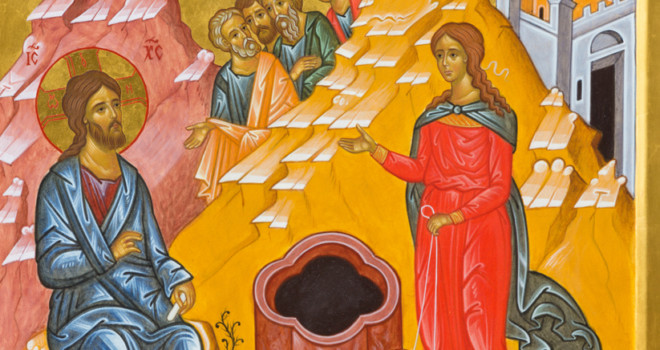
 Sitting by the well, Jesus thirsted. But it was more than physical water He desired.
Sitting by the well, Jesus thirsted. But it was more than physical water He desired.
In the account in John 4, Jesus arrives at the well before the Samaritan woman. He is tired, and, based on what He says later, also thirsty. Yet, alone at the well, there is nothing he could have used to drink from its waters without bringing His own bucket. And so Jesus thirsted and waited while his disciples went to the market searching for food.
Then the Samaritan woman appears:
Jesus said to her, “Give me a drink.”
The Samaritan woman said to him, “How can you, a Jew, ask me, a Samaritan woman, for a drink?” (For Jews use nothing in common with Samaritans.)
Jesus answered and said to her, “If you knew the gift of God and who is saying to you, ‘Give me a drink,’ you would have asked him and he would have given you living water.”
The woman said to him, “Sir, you do not even have a bucket and the well is deep; where then can you get this living water? Are you greater than our father Jacob, who gave us this well and drank from it himself with his children and his flocks?”
Jesus answered and said to her, “Everyone who drinks this water will be thirsty again; but whoever drinks the water I shall give will never thirst; the water I shall give will become in him a spring of water welling up to eternal life.”
The woman said to him, “Sir, give me this water, so that I may not be thirsty or have to keep coming here to draw water” (John 4:10-15).
The discussion continues, with Jesus announcing that He is the Messiah. At this, the woman leaves her jar at the well and returns to her town, telling them of the Messiah.
Jesus never does get His drink. Instead, His request transforms into an offer. Consider again His response to the woman’s question:
Jesus answered and said to her, “If you knew the gift of God and who is saying to you, ‘Give me a drink,’ you would have asked Him and He would have given you living water” (verse 10).
When contemplating Jesus’ words, St. Augustine concludes that His true thirst was spiritual, not physical:
Why did the Lord request a drink of the Samaritan woman who had come to fill her jar with water, when afterwards He Himself was going to say that He could give the gushing of a spiritual fountain to those asking? Well, obviously, the Lord was thirsty for the trust of that woman (Eighty Three Different Questions, 64.4)
Jesus is calling on the woman to have faith by recognizing and knowing who He truly is (‘If you knew … who is saying to you.’) In the Greek, the verb translated as know is eidō, which often refers to truths that are perceived or ‘seen’ through the intellect. Here is just one example from Matthew 2:2, where the Magi are describing what drew them to Judea: “We saw [eidō] his star at its rising and have come to do Him homage.”
The kind of seeing that Jesus is talking about, then, is the kind of spiritual vision made possible through the eyes of faith. As St. Paul declared in 2 Corinthians 5:7, “We walk by faith, not by sight.”
Knowing Jesus leads to trusting in Him. This is indicated in Jesus’ suggestion that if she had known who He was then she would have asked for ‘the gift of God’—and she would have received it. As Jesus says in Matthew 21:22, “Whatever you ask for in prayer with faith, you will receive.” Faith is what enables us to ask God for things in the confidence that He will answer our requests.
So Jesus thirsts for her faith, as Augustine says. But He thirsts for much more than this.
Just as Jesus, on a natural level, thirsts for water, so also He wants the woman, on a supernatural level, to thirst for God. This is what the Church Fathers called the ‘marvelous exchange’ of the Incarnation. In becoming man, God enabled us to become like Him. Jesus experienced the natural desire for earthly things like food, water, clothing, and shelter, so that we might experience the supernatural desire for heavenly things.
In other words, the gift that Jesus is offering the woman at the well is the gift of desiring God—of loving Him.
In a sense, this might seem like a strange thing to say. How can one person give another the ‘gift’ of desiring them?
In purely human terms, this may not be possible. But it is possible in the Trinity, where God as three persons is His own community, knowing and loving Himself as completely, fully, and freely as one person knows and loves another. No one knows better how to love and how to love God than God Himself. As St. Gregory of Nyssa puts it,
For the life of the Supreme Being is love, seeing that the Beautiful is necessarily lovable to those who recognize it, and the Deity does recognize it, and so this recognition becomes love, that which He recognizes being essentially beautiful (On the Soul and Resurrection).
Therefore it is from God that we must receive the ability to love Him.
This is confirmed by a close reading of the text. Notice that Jesus tells the woman that she would have asked for the ‘gift of God.’ The Greek word for gift here, dōrea, is used almost exclusively in the New Testament to refer to the Holy Spirit. For example,
Peter said to them, “Repent and be baptized, every one of you, in the name of Jesus Christ for the forgiveness of your sins; and you will receive the gift of the Holy Spirit” (Acts 2:38).
For it is impossible in the case of those who have once been enlightened and tasted the heavenly gift and shared in the Holy Spirit … (Hebrews 6:4).
Traditional Trinitarian theology associates the Holy Spirit with God’s divine love of Himself. Therefore it is most fitting—and also most wonderful—that He gives us the Spirit in order that we might be able to participate in God’s own love of Himself. As St. Augustine writes in his treatise on the Trinity,
If there be among the gifts of God none greater than love, and there is no greater gift of God than the Holy Spirit, what follows more naturally than that He is Himself love, who is called both God and of God? And if the love by which the Father loves the Son, and the Son loves the Father, ineffably demonstrates the communion of both, what is more suitable than that He should be specially called love, who is the Spirit common to both? (On the Trinity, 15.19.37).
That this is the Spirit is further indicated by Jesus’ phrase ‘living water’—an obvious reference to the baptismal waters through which we are regenerated and first receive the Holy Spirit. Through baptism we are adopted into the family of God, becoming children of the Father and brothers of Christ—experiencing the interior love of the divine community.
When we receive this special water, something amazing happens: we will never thirst again. This is not because we don’t need water again. It’s because once we have received this water a radical change takes place within our souls: ‘The water I shall give will become in him a spring of water welling up to eternal life.’
By giving us the Holy Spirit, God brings the well to us. In receiving the Spirit, we are so radically transformed that we become like wells—so filled with the ‘fullness of God’ that it ‘wells up’ inside of us, lifting us all the way up to heaven.
image: BOLOGNA, ITALY – APRIL 18, 2018:The icon of Jesus and Samaritans at well scene in church Chiesa di San Pietro by Giancarlo Pellegrini by Renata Sedmakova / Shutterstock.com.










